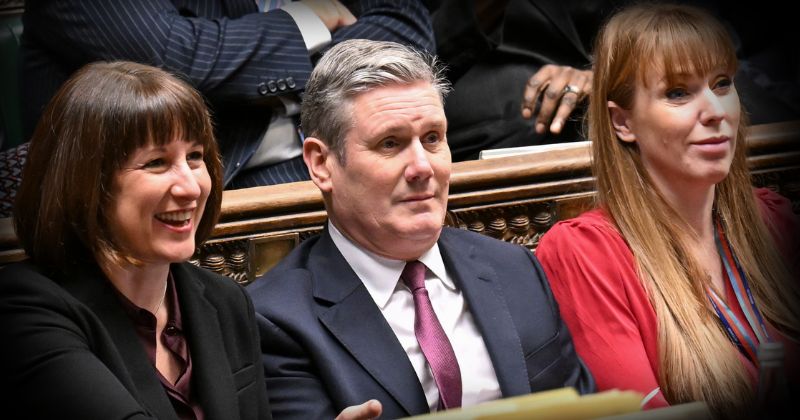

By KD Tait
AFTER 14 years of government, the Conservative Party’s lingering death in the wake of the Brexit disputes was followed by the sudden death in an election which granted Labour a 170 seat majority.
But beneath the landslide lies an increasingly polarised society, with the populist anti-immigrant Reform running Labour close across northern and Welsh seats and the Greens picking up nearly two million votes. Labour’s majority rests on a vote share of 34%—and that on a turnout of just under 60%.
Labour’s majority is built on sand. Half of the cabinet are looking over one shoulder to Reform voters, while the other half are looking over their left shoulder to the millions who voted for Green, pro-Palestine Independents and the millions more whose total alienation is undermining the legitimacy of the parliamentary façade itself.
Labour’s one-word campaign slogan, ‘Change’, was paired with a manifesto whose content was as empty as its ambition was broad. Spending plans that the straightlaced Institute for Fiscal Studies thinktank described as ‘tiny, going on trivial’ were confined to technocratic tweaks and sounding the hot air klaxon of ‘economic growth’.
The party’s commitment to Tory spending plans, i.e. more austerity, was not a surprise. But their huge majority in the Commons will encourage people to demand Labour drop the supposedly vindicated caution of an election campaign to soak the rich and turn on the spending taps. After 14 years of the Tories, people aren’t in the mood to wait another 10 for Starmer’s ‘project of national renewal’.
The excuse for this is already being prepared. Learning from the experience of George Osborne who justified austerity on the basis that there was ‘no money left’ from Gordon Brown’s outgoing government, Labour is already complaining that the financial situation is ‘worse than predicted’. Comparisons are frequently, if unwisely, made with the situation that faced Clement Attlee’s 1945 government that, among other things, founded the NHS and nationalised the Bank of England.
Chancellor Rachel Reeves’ first speeches were intended to reassure Britain’s bosses and the international money markets that a change of government means business as usual for the house builders, private contractors and speculators who have dined at the trough of public contracts for three decades.
Politics, we are told, is about choices. And this Labour government has trumpeted its willingness to make the ‘difficult decisions’ that British capitalism demands: no increase in welfare spending to lift millions of children out of poverty, no ban on right to buy discounted council homes for private gain, no restoration of public sector pay, full steam ahead with £20 billion of public sector cuts.
These are just the straightforward reforms that could be enacted with a stroke of the Chancellor’s pen. More widely, this government will have to be forced to break its unconditional backing for Israel’s genocidal war in Gaza, to oppose cuts and abolish the anti-union laws, to take the polluters into public ownership, and to fight racist populism by providing decent wages, houses and public services for the whole working class—wherever they come from.
But as their resistance to stumping up the paltry £3 billion that it would cost to abolish the two child benefit cap shows, we won’t get anything from Labour that we don’t fight for. New Work and Pensions Secretary Liz Kendall’s speech, which denounced the cruelty of the cap before concluding that nothing could be done ‘for now’, exposes the contradiction that has to be exploited.
We need to apply maximum pressure to these contradictions as early as possible. Labour’s long wait makes them think they deserve a long honeymoon. The leaders of many trade unions and the TUC agree. They don’t want a repeat of the 2023 strike wave, this time against ‘their’ government.
A key area where trade unions can organise is Labour’s ‘Plan to Make Work Pay’, which the party wants to legislate for in its first 100 days. This plan has already been watered down and Labour says it will consult with bosses before finalising its proposals.
We know what kind of consultation the corporate lobbyists are going to give—the question is what are the demands of the labour movement leaders? TUC president and FBU leader Matt Wrack, a left posturing bureaucrat, has already indicated Labour could buy time on pay by granting some concessions over trade union rights.
To get reforms out of Labour will be like drawing teeth. At the same time we have to contend with our own leaders who are already preparing to cut deals, make concessions and sell the interests of our class short, in return for sweeteners for (some of) their own members.